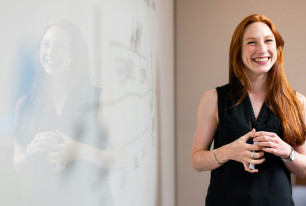Managing Remote Teams: We Are in It for the Long Haul
5 ways that people leaders can help develop sustainable working habits with their remote teams as we enter the second phase of lockdown.
Share
As we enter the “second phase” of the pandemic the long-term reality of our working circumstances has become apparent. In the spring we had geared up for a few months of working remotely — riding out the storm and then we started to see the other side. Over the summer we flirted with normality, eating at our favorite restaurants and seeing friends and family again, maybe even going into the office. Our work behaviors had also begun to return to old habits.
The shorter meetings, the virtual coffee breaks, and the excitement and novelty of virtual communication of the first lockdown have calmed down. But does it have to? Perhaps we were too quick to rush back to our old ways. We have the opportunity to go into this phase by learning from what worked and didn’t work from phase one.
McKinsey reported that productivity had increased by 41% during the spring lockdown. But having no time to go to the restroom and causing indigestion by devouring your lunch is not a trade-off we should be willing to put up with. Not to mention the effect that working in this way can have on your mental health. We need to think about working behaviors that are more sustainable.
Social learning theories tell us that as humans we tend to learn from each other and mimic what we see around us. And when we are in a crisis we go through a trial and error process to figure out the best approach. So, what have we learned so far and how do we implement strategies that help us to work more productively in a remote environment for the longer term?
McKinsey reported that productivity had increased by 41% during the spring lockdown.
People managers have a crucial role to play in exemplifying good behavior, if we set the precedent then others will be encouraged to follow. I am using this period to reflect on what I can do better as a people manager — Here are 5 ways I plan to help promote healthier long term behaviors as we enter into the second phase of this pandemic:
Try Shorter Meetings
We all know that hour-long meetings are not a good use of time and yet we find ourselves with a diary packed full of them. Who decided meetings need to fit neatly into half-hour slots?! Push back, ask the organizer whether it can be 45 or even 20 mins. The extra time means you can grab a drink, take a comfort break or just have some headspace. Also, remember that not all conversations need to be scheduled, you can just try calling a colleague for a quick chat.
Use Technology to Its Fullest Potential
I am always learning more about the programs we use internally and their hidden functionalities. Live document editing on teams is great as it means people can log on, review, and edit in their own time. Rather than having a meeting about it where there is no actual output. Another personal favorite is live note-taking on teams, drop the notepads, and get typing. It automatically saves and means those not present can easily catch up.
Video calls have been compared to a “performance” especially for introverts and they can be energy zapping.
Be Conscious about Always Being “On”
Video calls have been compared to a “performance” especially for introverts and they can be energy zapping. Quite frankly sometimes you want to sit there in your pajamas with greasy hair – that used to be a big perk of working at home! So, specify what occasions warrant a performance but don’t expect all of them to be.
Put in Some Downtime
It sounds strange to say this but put in some downtime: Some of my peers have “golden hour” in their calendars where no meetings can be scheduled. At the very least you can put time in for lunch, maybe stretch your legs and get some steps in. When others look in your calendar they will think “gosh why am I not doing that?” And the likelihood is they will try something similar.
Encourage Cross Peer Collaboration and Support
Research shows that during this period most people look to their peers for support rather than using organizational tools or resources. As managers, we can encourage this by organizing virtual drinks or coffee breaks. This was happening in the spring lockdown and in my view needs to make a return. Maybe try smaller groups for less awkwardness. And remember we can still meet people outside for walks – if your colleagues live close by this could be a good option.
There is a need to reflect, take stock, and plan for the longer term. If you and your teams have fallen back into bad habits, then now is the time to press the reset button.
You and your team can learn more about the strengths and areas for development in a remote working world through SHL’s RemoteWorkQ. For more information, contact us!









